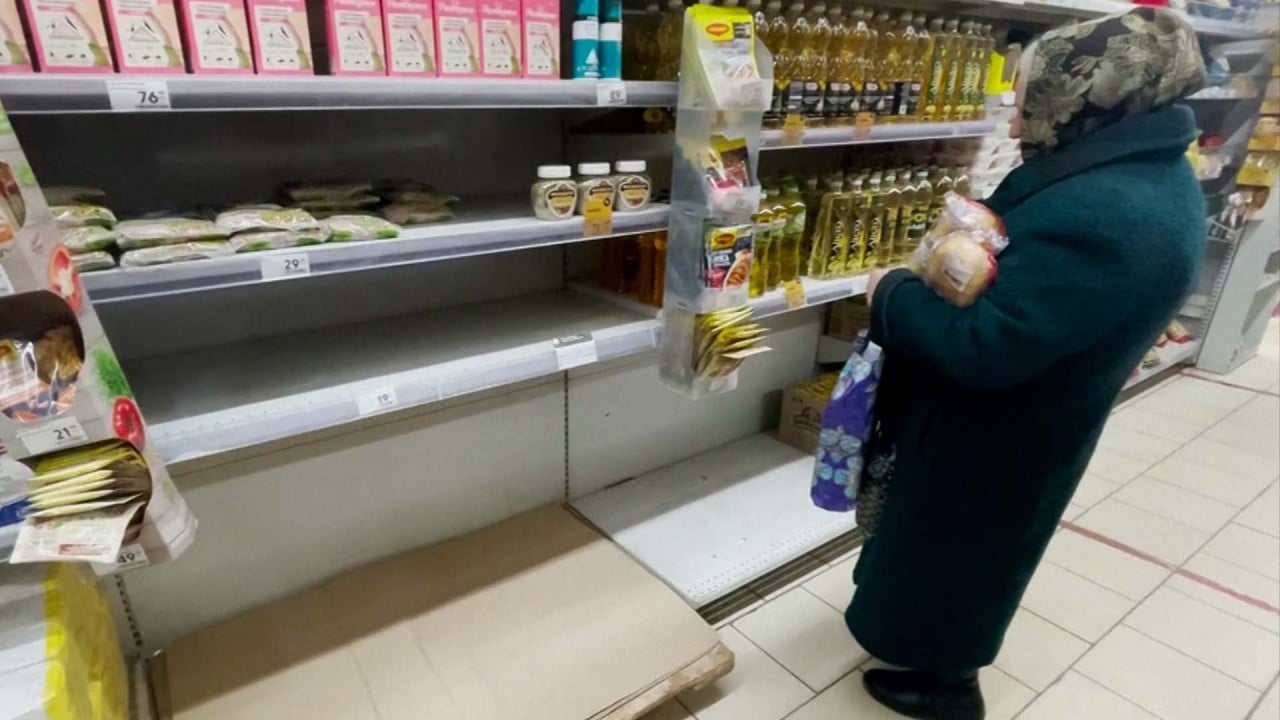
02:52
Ordinary Russians feel economic pain of Western sanctions on Moscow over Ukraine invasion
Ukraine war: Sanctions see Russians panic buy antidepressants, sleeping pills
- Russians buy extra supplies of medicines as many fear shortages and price hikes due to Western sanctions over war Ukraine
- Data shows increased demand for antidepressants, sleeping pills, insulin, cancer and heart drugs, hormones and contraceptives
Russians have rushed to stock up on antidepressants, sleeping pills and contraceptives among other products since the conflict in Ukraine began, data released on Thursday showed, with people buying a month’s worth of medicine in just two weeks.
Although official opinion polls suggest most Russians support President Vladimir Putin’s decision to send tens of thousands of troops into Ukraine, social media, interviews and anecdotal data suggest many Russians have been distressed by the severity of the sanctions imposed on Moscow by the West to try to force it to withdraw its forces.
Many foreign brands have announced they are suspending their operations or quitting Russia, the rouble’s value against the dollar has slumped dramatically, and prices for many everyday products have soared since February 24 when Putin announced what he called “a special operation” in Ukraine.
“I myself take L-thyroxine as I have issues with my thyroid gland so I’m taking it daily and I worry about it,” Valentina, a Moscow resident, said.
“That’s why I bought a supply of it for a couple of months in advance as I’m worried if I will be able to find it in pharmacies later. People are asking for it everywhere.”
Russian Health Minister Mikhail Murashko this week urged people not to buy extra supplies of medicines.
“I want to tell the public: you don’t need to stock up,” Murashko said during a televised cabinet meeting with President Vladimir Putin.
“The suppliers say that deliveries are continuing as planned,” he stressed.
‘Financial nuclear war’: Russia now world’s most-sanctioned nation
Murashko said that monitoring of pharmacies had found that “there were shortages of a number of drugs”, which he linked to panic buying.
Sales data gathered by analytical company DSM Group for the daily Vedomosti newspaper showed on Thursday that Russians had bought 270.5 million medicinal items in pharmacies from February 28 until March 13 for 98.6 billion roubles (US$1.04 billion).
That was almost comparable to the sales data for the entire month of January when Russians bought 288 million items in pharmacies for 100 billion roubles.
The latest data, which did not name specific brands, showed an upsurge in demand for foreign-produced pharmaceuticals with demand for Russian-made products growing too.
In particular, it showed sharply increased demand for antidepressants, sleeping pills, insulin, cancer and heart drugs, hormones and contraceptives.
“It was fear,” Sergei Shulyak, general director of DSM Group, the company that gathered the data, told Reuters.
“The first fear was that everything could get more expensive and the second fear was that medicines they need won’t be available in some time. Those fears moved people. They stood in lines at pharmacies and bought everything.”
Shulyak, who said what he called “hysteria” had taken hold, said there was now a temporary shortage of some medicines, but said he expected the situation to stabilise in time with Russian manufacturers still able to produce generic drugs and many foreign producers continuing to supply Russia even if their products were now being sold at a higher price.
Ukraine war, Russia sanctions could batter British fish and chip shops
He warned however that worsening ties with the West meant some Russian drug producers were having problems sourcing ingredients they needed to make their products.
Some Russians said they were unfazed by the panic.
“There might be some (shortages) especially if the medicine is imported, but I think it will all come back because politics is politics, economics is economics,” said Vladimir, a Moscow resident. “They (the drug manufacturers) all need to sell, they all need to gain profit, so it’ll all be back.”
Additional reporting by Agence France-Presse

